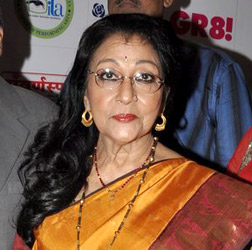
Alda Sinha, better known by her stage name Mala Sinha, is a former Indian actress who has worked in Hindi, Bengali and Nepali films. Initially starting her career with regional cinema, she went on to become a top leading actress in Hindi Cinema in the late 1950s, 1960s and early 1970s. In a career spanning four decades, Mala Sinha rose to prominence with films like Guru Dutt's Pyaasa (1957) and Yash Chopra's Dhool Ka Phool (1959). Later, she starred in over hundred film productions including Phir Subah Hogi (1958), Hariyali Aur Rasta, Anpadh, Dil Tera Deewana (1962), Gumrah, Bahurani, Himalay Ki God Mein (1965), Aasra (1966), Ankhen, Do Kaliyan, Maryada (1971). She was known as the "daring diva" and "torch bearer of women's cinema" for essaying strong female centric and unconventional roles in a range of movies considered ahead of their times. Having received multiple awards and nominations, she was given the Filmfare Lifetime Achievement Award in 2018.

Leela Chitnis was an Indian actress in the Indian film industry, active from the 1930s to the 1980s. In her early years she starred as a romantic lead, but she is best remembered for her later roles playing a virtuous and upright mother to leading stars.
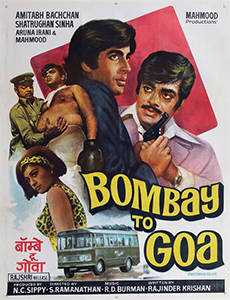
Bombay to Goa is a 1972 Indian Hindi-language road comedy film directed by S. Ramanathan and produced by Mehmood and N. C. Sippy. Released in India on 3 March 1972, the film stars Amitabh Bachchan, Aruna Irani, Shatrughan Sinha, Nazir Hussain, Mehmood and Anwar Ali in lead roles. The film is known particularly for its catchy tunes and was a "superhit" at the box office. The film is a remake of a 1966 hit Tamil film Madras to Pondicherry and was an inspiration for the 2004 Marathi movie Navra Maza Navsacha which in turn was remade in Kannada in 2007 as Ekadantha. The Hindu had reported that Rajiv Gandhi was offered the lead role by Mehmood but he had turned it down.

Ganwaar is a 1970 Indian film produced and directed by Naresh Kumar. It stars Rajendra Kumar, Vyjayanthimala, Pran, Jeevan in pivotal roles. The film's music is by Naushad. This is Vyjayanthimala's last film. The film proved that Naushad is not only good at classical, but modern music as well.

Pooja Ke Phool is a 1964 Indian Hindi-language movie. Produced by A. V. Meiyappan and directed by Bhimsingh, the film stars Ashok Kumar, Dharmendra, Mala Sinha, Nimmi, Sandhya Roy and Pran in pivotal roles. The film's music was composed by Madan Mohan. This is a remake of the Tamil film Kumudham.
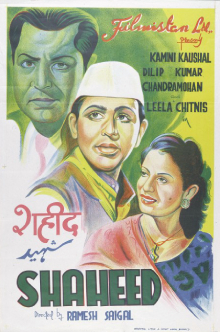
Shaheed is a 1948 Bollywood Indian romance film, written and directed by Ramesh Saigal. The film depicts India's struggle for independence. It starred Dilip Kumar, Kamini Kaushal, Chandra Mohan, and Leela Chitnis. It had music by Ghulam Haider. Shaheed was the Highest grossing indian movie of 1948.

Dhool Ka Phool is a 1959 Indian Hindi-language film produced by B. R. Chopra and directed by B. R.'s brother Yash Chopra, being his first movie as a director, having been an assistant director in B. R.'s earlier film Naya Daur. The film stars Rajendra Kumar, Mala Sinha, Ashok Kumar and Nanda in lead roles along with Leela Chitnis, Jeevan and Manmohan Krishna. The story revolves around a Muslim man bringing up an "illegitimate" Hindu child and featured the classic song Too Hindu Banega Na Musalman Banega, Insaan Ki Aulaad Hai, Insaan Banega on Manmohan Krishna, who also won the Filmfare Award for Best Supporting Actor for his role as Abdul Rasheed. Besides that, Sinha received a nomination for Best Actress and Mukhram Sharma for Best Story. The film was remade in Telugu as Jeevana Teeralu (1977).
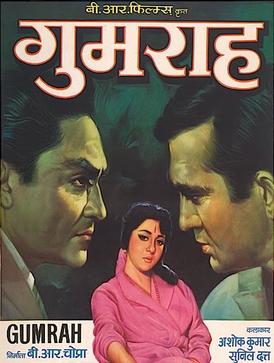
Gumrah (transl. Astray) is a 1963 Hindi-language romantic drama film produced and directed by B. R. Chopra. The film stars Sunil Dutt, Ashok Kumar, Mala Sinha, Nirupa Roy, Deven Verma and Shashikala. The music was composed by Ravi and the lyrics were by Sahir Ludhianvi. The film was a box office success. It was remade in Malayalam as Vivahitha (1970). The 2005 film Bewafaa was reported to be a rehash of this movie. For her performance, Shashikala won the Filmfare Award for Best Supporting Actress.
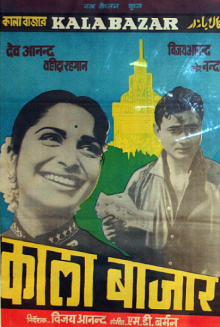
Kala Bazar is a 1960 Hindi crime film produced by Dev Anand for Navketan Films. Written and directed by Dev's younger brother Vijay Anand, the film starred Dev Anand, Waheeda Rehman, Vijay Anand, Chetan Anand, Nanda, Rashid Khan, Madan Puri, Leela Chitnis, Mumtaz Begum and Helen. S.D. Burman composed the music, while the lyrics were penned by Shailendra.

Zindagi (transl. Life) is a 1964 Indian Hindi-language film produced by S. S. Vasan, Gemini Pictures and directed by Ramanand Sagar. The film stars Rajendra Kumar, Vyjayanthimala, Raaj Kumar, Prithviraj Kapoor, Mehmood, Jayant, Jeevan, Leela Chitnis and Helen. The film's music is by Shankar Jaikishan. The film was remade in Tamil as Vaazhkai Padagu (1965) and in Telugu as Aada Brathuku (1965).
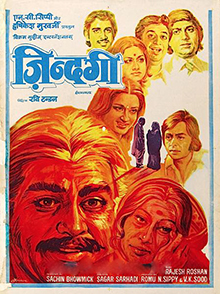
Zindagi (transl. Life) is a 1976 Hindi movie produced by Romu Sippy and directed by Ravi Tandon. The film stars Mala Sinha, Sanjeev Kumar, Vinod Mehra, Moushumi Chatterjee, Aruna Irani, Deven Verma, A. K. Hangal, Padmini Kolhapure, Keshto Mukherjee and Iftekhar. The film's music is by Rajesh Roshan. The movie is based on the 1937 Leo McCarey movie Make Way for Tomorrow which was also later adapted in 2003 in Hindi as Baghban.
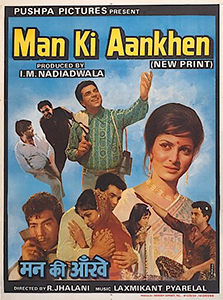
Man Ki Aankhen is 1970 Indian Hindi language film directed by Raghunath Jhalani.

Ek Nari Ek Brahmachari is a 1971 Indian Hindi-language comedy film, produced by P. Gangadhar Rao Jothee Navshakthee Combines and directed by K. Pratyagatma. It stars Jeetendra and Mumtaz, with music composed by Shankar Jaikishan. The film is a remake of the Telugu film Brahmachari (1968) which itself was based on the 1967 Tamil movie Penne Nee Vaazhga.
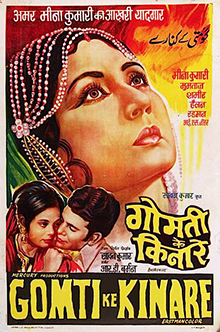
Gomti Ke Kinare is a 1972 Bollywood drama film, directed by Saawan Kumar Tak in his directorial debut. The film stars Meena Kumari and Mumtaz. It was the last release of Meena Kumari, and was released posthumously on 22 November 1972, 8 months after her death on 31 March.

Dharmputra is a 1961 Hindi film directed by Yash Chopra based on a novel of the same name by Acharya Chatursen. This is Yash's second directorial venture. It was the first Hindi film to depict the partition of India, and Hindu fundamentalism. Produced by his elder brother B.R. Chopra, who was himself uprooted from Lahore, during the partition of India and established B.R. Films in Mumbai in 1956. The film dealt with issues of religious bigotry, fanaticism and communalism amidst the backdrop of the partition. Two years earlier, Yash Chopra had made his debut with Dhool Ka Phool (1959), steeped in Nehruvian secularism, wherein a Muslim brings up an "illegitimate" Hindu child and featured the classic song "Tu Hindu Banega Na Musalman Banega, Insaan Ki Aulaad Hai, Insaan Banega". The theme was reversed in this film as herein a Hindu family brings up an illegitimate Muslim child.

Maryada is a 1971 Indian Hindi-language tragedy film directed by Arabind Sen. The film stars Rajesh Khanna, Raaj Kumar and Mala Sinha. This film is counted among the 17 consecutive hit films of Rajesh Khanna between 1969 and 1971, by adding the two-hero films Marayada and Andaz to the 15 consecutive solo hits he gave from 1969 to 1971.

Leela Mishra was an Indian actress. She worked as a character actor in over 200 Hindi films for five decades, and is best remembered for playing stock characters such as aunts. She is best known for her role of "mausi" in the blockbuster Sholay (1975), Dil Se Mile Dil (1978), Baton Baton Mein (1979), Rajesh Khanna films such as Palkon Ki Chhaon Mein, Aanchal, Mehbooba, Amar Prem and Rajshri Productions hits such as Geet Gaata Chal (1975), Nadiya Ke Paar (1982) and Abodh (1984). Her career's best performance was in Naani Maa in 1981, for which she received Best Actress award at the age of 73.
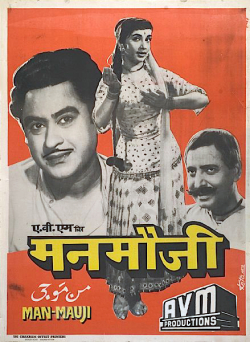
Man Mauji is a 1962 Indian Hindi-language film starring Kishore Kumar and Sadhana in lead roles and directed by Krishnan–Panju. It was Jayalalitha's first Hindi film, in which she played Lord Krishna in a 3-minutes dance sequence with Naaz, who played Radha in the same dance program. The film was a remake of Telugu film Donga Ramudu.

Ujala (Light/Luminosity) is a Bollywood romantic crime film released in 1959, starring Shammi Kapoor, Mala Sinha, Raaj Kumar, Leela Chitnis and Tun Tun. Naresh Saigal was the story writer as well as the director. Ujala features one of the popular Bollywood songs "Jhoomta Masoom, Mast Mahina" played by Shammi Kapoor and Mala Sinha, sung by Manna Dey and Lata Mangeshkar. The film came with a message; "Honesty always triumphs". The film's music was by Shankar–Jaikishan, with lyrics by Shailendra and Hasrat Jaipuri.
Bandi is a 1957 Indian drama and family film directed by Satyen Bose and starring Kishore Kumar, Ashok Kumar, Shyama and Bina Rai



















